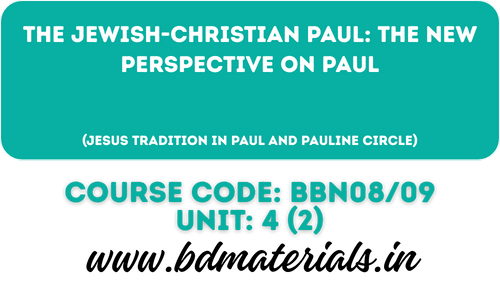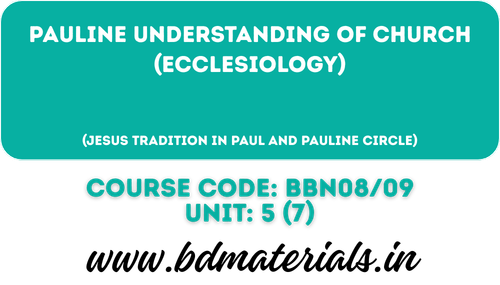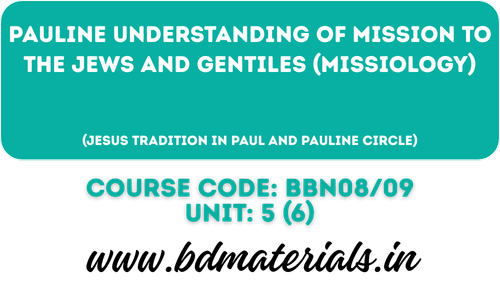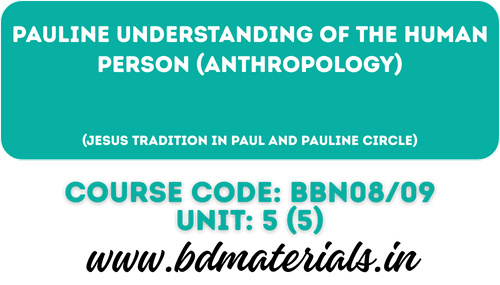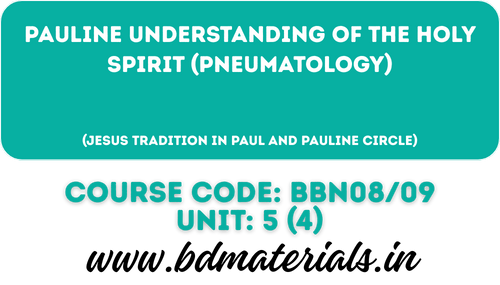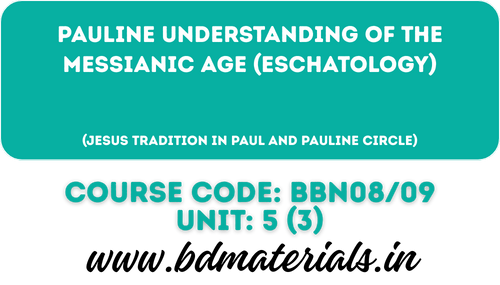The Jewish-Christian Paul: The New Perspective on Paul
Introduction
Paul is one of the early Christian leaders, often considered to be one of the most important person in the history of Christianity. With regard to Paul and his teachings, there emerged a New Perspective on Paul, a movement within the field of biblical studies that gave a response to traditional interpretations. It argues that Paul’s writings should be understood in the context of first century Judaism and re-assessed the traditional Pauline understanding of the doctrine of justification, the nature of good works, and other elements essential to the Gospel of Jesus Christ.1 Thus, this paper is an attempt to present the Jewish influence on Paul and present the view of various scholars toward the New Perspective on Paul.
1. Understanding the Jewish-Christian Paul
The concept of a Jewish-Christian Paul refers to the idea that Paul despite his significant role in the spread of early Christianity among Gentiles remained deeply rooted in his Jewish identity, heritage and religious framework. His conversion was not from Judaism but to what he believed was its true fulfillment of the covenants made with the Jewish people. Paul’s theology was deeply influenced by the religious and theological discussions of the Jewish religious context of his time. Paul’s hope for future was rooted in the eschatological expectations of the context that God’s promises to Israel were being fulfilled through Jesus and that the resurrection of Jesus was a central element. His understanding of Torah and the Law was not a rejection of Judaism but a critique of how the law was being misunderstood within the early Christian communities. Therefore, while he rejected some aspects of his past he never ceased seeing himself as a part of Israel. Thus, the Jewish-Christian Paul seeks to portray Paul as a bridge between Judaism and early Christianity rather than a radical convert.2
2. The New perspective on Paul
The New Perspective on Paul is a scholarly movement that emerged in the 1980’s which challenged the traditional Protestant interpretations of Paul’s theology. It argues that Paul’s writings should be understood in the context of first century Judaism rather than as a rejection of it. This perspective emphasizes the continuity between Judaism and Christianity and highlights the importance of understanding Paul’s teachings in their historical and cultural context. It also challenges the traditional Protestant view of justification by faith alone, arguing that Paul’s emphasizes on faith was not a rejection of works, but rather a rejection of the legalistic approach of the Judaism that Gentiles should follow the Jewish law in order to be a part of the church. Another key aspect of the New Perspective on Paul is that Paul’s understanding of the law was not negative but positive. Paul saw the law as a gift from God that revealed God’s will and provided a way of life for Israel. However, he also recognized that the laws could not save or justify anyone and so he emphasized the need for faith in Christ as the only way of salvation. Thus, justification is related to grace, Christ’s work and faith and not just to ecclesiology.3
Therefore, with this brief understanding on the New Perspective of Paul, the paper will further discuss the view of four scholars on this perspective.
3. Presentation of scholars view towards the New Perspective on Paul
The four scholars who felt the need of alternative presentation of Paul with a view to improving relations between Jews and Christians are E.P. Sanders, James D.G. Dunn, W.D. Davies and N.T. Wright.
3.1. E.P. Sanders
E.P. Sanders, born on 18th April, 1937 was an American New Testament scholar and a principal proponent of the “New Perspective on Paul.”4 Sanders challenged the Reformation paradigm in Pauline theology. He compared Judaism and Paul without pre-conceptions, examining ancient Palestinian Jewish literature. He rejected the idea of Judaism as legalistic, introducing covenantal nomism, which emphasizes obedience to maintain one’s place in God’s covenant, with entry based on God’s grace. Salvation was a result of God’s grace, not earned through works, with the law providing atonement.5
For Sanders, the language of Justification is “transfer terminology”. To be justified is to enter into the covenant people. He states that the law is excluded as an entry requirement into the body of those who will be saved but entrance must be by faith apart from the law. The debate between faith and law, he writes is a debate about entry requirements, not about life subsequent to conversion. Sander is of the stance that entry to the covenant is through faith, however, one must behave appropriately and observe the law to retain their status in the covenant. Elements of the law like circumcision, Sabbath keeping, food laws which create social distinctions between Jews and Gentiles has to be discarded although Paul did not give a rational explanation for the selective use of the law. Thus, Paul’s view on the law varied depending on the context. Sanders theory of covenantal nomism changed interpretations of Paul’s relationship with Judaism, salvation and grace.6
3.2. James D.G. Dunn
James Dunn was the one who coined the term “The New Perspective on Paul” in his landmark 1982 Manson Memorial Lecture. He was instrumental in applying Sander’s research to Paul’s epistle. Although Dunn expresses appreciation for the traditional Reformation approach to Paul, he wholeheartedly endorses Sander’s thesis. He has emphasized the concept of covenantal nomism which considered Jews as members of the covenant community by birth but their continued membership was based on faithfulness to the covenant. He also reinterpreted Paul’s use of the term “works of the law” as a boundary marker that demarcated Jewish identity rather than human effort to earn salvation. He addressed that Paul’s primary concern was not individual salvation but unity of the Jewish and Gentile believers within the church which has the significance of God’s election and calling in Pauline theology. Dunn also talks about Paul’s redemptive-historical perspective which saw God’s action in Christ as the fulfillment of God’s plan for Israel and the world, leading to the inauguration of the eschatological age.7
Dunn recognizes both continuity and discontinuity between Judaism and Paul’s theology. While Paul’s thoughts depart from some aspects of Second Temple Judaism, it is still rooted in the broader Jewish covenantal tradition.
3.3. W.D. Davies
Davies represented the Salvation History or Redemptive History approach to Pauline studies and question whether justification by faith is theological centre of Paul’s thought. Davies has sought to demonstrate that Paul belonged to the main stream of First Century Judaism. According to him, “Pauline Christ is a new Torah, the source of implication of that fact Paul consistently drew of upon concepts derived from Rabbinic Judaism. Davies argues against the influential essay of C.G. Montefiore which had placed Paul firmly in the context of Diaspora Judaism. For Davies, Paul remained “Hebrew of the Hebrews, and baptized his Rabbinic heritage into Christ. So, Davies was trying to show that Paul maintained a positive relationship with his Pharisaic and Rabbinic traditions and is not only Rabbinic Judaism the most appropriate context for interpreting Paul.8
3.4. N. T Wright
N.T Wright one of the recent scholars on “The New Perspective of Paul,” believes that Israel was still under the curse of Deuteronomy 29 in the first century. The exile did not end when the Jews returned from Babylon, but it continued on into the days of Jesus, as seen in Rome’s control over Israel. Wright asserts that Jesus came to end both the curse and the exile, and initiate the new covenant and its blessings. Thus, for Wright Pauline theology and justification by faith have less to do with the individual and their problem with sin (through of course human do indeed have the problem of sin) but rather Paul’s theology and justification by faith was emphasized upon the plight of the Jews nation as a whole. Hence according to the Wright, the core of Paul’s gospel was not justification by faith, but the death and resurrection of Christ and his exaltation as Lord.9
Another perspective that Wright focuses is the concept of covenant. He argues that Paul’s theology revolves around God’s covenant promises to Israel and how they are fulfilled in Christ. To him, the proclamation of the gospel was the proclamation of Jesus as Lord and Messiah who fulfilled the expectation (Rom. 1: 16, 17) and not the justification by faith as found in Rom. 1:16&17. Therefore, the mission of Paul was not to create a new religion separate from Judaism but to include Gentiles within the covenant community.10
In a nutshell, N.T. Wright’s New Perspective on Paul challenges traditional understanding of Pauline theology, particularly the doctrine of justification. It emphasizes the centrality of God’s covenant and the inclusion of both Jews and Gentiles in the people of God.
Evaluation
The New Perspectives on Paul as provided by the eminent scholars has made significant contributions to understanding Paul within his Jewish context. They have contributed to agree on the same implications of interpreting Paul’s theology although there are some differences and disagreement like Sanders accepting that the language of justification is “transfer terminology” however, for Dunn there are on-going and future elements of justification as well as the initial act of acceptance. Their contributions have challenged the traditional Protestant interpretations of Paul’s theology, particularly the doctrine of justification. They have made emphasis on God’s covenant and the inclusive nature of the gospel which have important implications for theology and ecclesiology.
E.P. Sander’s argues that justification is a process of transformation that flows from one’s participation in Christ. James Dunn believes that justification is a series of declarations which takes place throughout the believer’s life. N.T. Wright contends that justification is simply a matter of demonstrating the identity of who is a member and who is not a member of the community of the saved. Thus, redefining the doctrine of justification stands as a threat to the gift of Grace. Therefore, it can be viewed that there is a lack of one unified and cohesive theory since different scholars have proposed varying perspectives on Paul. It can also seen that E.P. Sanders have over generalized Second Temple Judaism while there is a diversity which does not fully represent the complexity and variation within the religious context. The emphasis of new perspective on covenant faithfulness and the community aspect of salvation are viewed as a departure from traditional Reformation theology and that Paul’s writings are interpreted through the lens of covenant theology, ignoring other theological motifs present in his letters. Nevertheless, the New Perspective on Paul remains relevant today by offering fresh insights into the historical context of early Christianity, stimulating theological reflection and renewal contributing to discussions on important topics such as ecclesiology, social justice and ecumenical dialogue. It encourages a deeper understanding of Pauline theology and its contemporary implications.
Conclusion
The paper has highlighted the rise of the New Perspectives on Paul and has articulated the views of various scholars and their understanding of Paul’s theology away from the traditional understanding. It has also evaluated on the scholars views and their differences which have questioned the validity of the perspectives however, it has also not failed to bring in positive impacts in today’s context. In conclusion, the New Perspective on Paul stand against the attitude of antithesis on Paul and Judaism and that it can provide a platform which can clear the misunderstanding between these two worldviews.
Bibliography
Dunn, James. The New Perspectives on Paul. Grand Rapids, Michigan: Eerdmans Publishing Company, 2005.
SP, Tunchapbo. Jesus Tradition in Paul and Pauline Circle. Delhi: Christian World Imprints, 2022.
Wright, N.T. What Saint Paul Really Said. Sandy Lane West, Oxford: Lion Publishing plc, 1997.
Ziesler, John. Pauline Christianity. New York: Oxford University Press, 1990.
Wright, N.T. Pauline Perspectives: Essays on Paul, 1978-2013. Minneapolis: Fortress Press, 2013.
Internet Source
Cara, Robert J. “Justification and the New Perspective on Paul.” https://www.thegospelcoalition.org/essay/justification-new-perspective-paul/. Accessed on 31/10/23.
Chancey, Mark. “Remembering E.P. Sanders, a New Testament Scholar who offered a new look at Judaism.” https://religionnews.com/2022/12/5/e-p-sanders-a-new-testament-scholar-who-redeemed-jesus-judaism/. Accessed on 31/10/23.
Footnotes
- James Dunn, The New Perspectives on Paul (Grand Rapids, Michigan: Eerdmans Publishing Company, 2005), 101.
- John Ziesler, Pauline Christianity (New York: Oxford University Press, 1990), 2.
- Rober J. Cara, “Justification and the New Perspective on Paul,” https://www.thegospelcoalition.org/essay/justification-new-perspective-paul/ (Accessed on 31/10/23).
- Mark Chancey, “Remembering E.P. Sanders, a New Testament Scholar who offered a new look at Judaism”, https://religionnews.com/2022/12/5/e-p-sanders-a-new-testament-scholar-who-redeemed-jesus-judaism/ (Accessed on 31/10/23).
- N.T. Wright, What Saint Paul Really Said (Sandy Lane West, Oxford: Lion Publishing plc, 1997), 18-19.
- Tunchapbo SP, Jesus Tradition in Paul and Pauline Circle (Delhi: Christian World Imprints, 2022), 76.
- Tunchapbo, Jesus Tradition, 78.
- Tunchapbo, Jesus Tradition, 81.
- N.T. Wright, Pauline Perspectives: Essays on Paul, 1978-2013 (Minneapolis: Fortress Press, 2013), 285-286.
- Wright, Pauline Perspectives, 292-293.
Friendly Note
Greetings in the name of our Lord Jesus Christ! We are deeply thankful for your visit to BD Materials. It is our mission and joy to serve Bible students, pastors, and believers with high-quality theological resources that strengthen faith and understanding of God’s Word.
At BD Materials, you’ll find study notes, articles, question papers, and valuable academic content designed to support your biblical and theological education. We are dedicated to helping you grow in knowledge, ministry, and devotion to Christ.
We also invite you to explore our partner sites: Telugu Gospel Lyrics, featuring inspiring gospel song lyrics in Telugu, and Theological Library, a hub for Christian book summaries and devotionals.
Your encouragement means a lot to us! We invite you to share your study materials, articles, or insights with our community. Thank you for being part of this mission—may God bless your studies and ministry abundantly!
